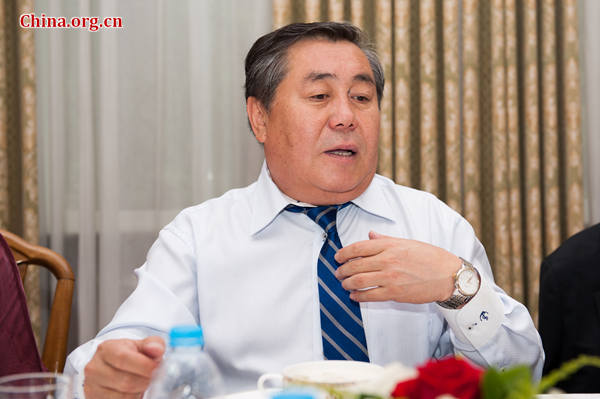Mongolia to send troops to China's Victory Day parade
- By Chen Boyuan
 0 Comment(s)
0 Comment(s) Print
Print E-mail China.org.cn, June 25, 2015
E-mail China.org.cn, June 25, 2015
 |
|
Mongolian ambassador to China Tsedenjav Sukhbaatar meets the press on Thursday, June 25, 2015. [Photo by Chen Boyuan / China.org.cn] |
Mongolian President Tsakhiagiin Elbegdorj will participate in China's celebrations marking the 70th anniversary of victory in the Chinese People's War of Resistance Against Japanese Aggression and World War II. The series of commemorative activities will also include a Victory Day military parade with an array of 75 Mongolian soldiers on Sept. 3, Mongolian ambassador to China Tsedenjav Sukhbaatar confirmed Thursday.
China's invitation of the Mongolian president and troops to its Victory Day parade acknowledges Mongolia's contribution to China's Anti-Japanese War, said Sukhbaatar.
The allied forces of the Soviet Union and Mongolia fought invading Japanese troops at Zhangjiakou and Chengde, cities near the Chinese capital of Beijing, in August 1945. During these battles, 53 Soviet Red Army soldiers and 13 soldiers in the Mongolian People's Army lost their lives.
As part of Mongolia's participation in the Chinese Victory Day celebrations, 30 Mongolian veterans of the 1945 Mongolian campaigns in China will pay tribute at the martyrs' monument in Zhangjiakou.
Mongolia has shown great interest in bolstering ties with China, one of the two countries it borders. China and Mongolia elevated their Strategic Partnership to a Comprehensive Strategic Partnership in August 2014 during Chinese President Xi Jinping's visit to Mongolia. Xi's Mongolia visit also saw the signing of 26 bilateral deals on trade, infrastructure, energy and financial cooperation.
The ambassador revealed that the group of deals reached during Xi's visit will entitle Mongolia to use six ports – including existing ports and some yet to be built – on China's Bohai Sea to help the landlocked country transport its exports.
Currently, China is Mongolia's largest trade partner and source of investment. One third of Mongolia's exports – mostly copper, coal, crude oil and iron – go to China. Last year, bilateral trade stood at US$6.26 billion, and the two states' leaders agreed last year to increase this figure to US$10 billion by 2020.
As China's importance in Ulaanbaatar's diplomacy grows, Mongolia pursues what it terms a "fair and balanced" foreign policy when dealing with Russia and China, meaning that it will not become overly dependent on one neighbor while neglecting the other. Additionally, Ulaanbaatar is pursuing the "Third Neighbor" foreign policy, actively building relations with various international organizations and with countries other than Russia and China.
Last year, Elbegdorj launched the trilateral Ulaanbaatar Summit, which brings together delegations from Mongolia, China and Russia. The first meeting of the summit was held in September 2014 in Dushanbe, capital of Tajikistan, on the sidelines of the Shanghai Cooperation Organization Summit.
Mongolia is an SCO observer state, a status that "meets the needs and foreign policy of Mongolia," said Ambassador Sukhbaatar. "Mongolia has no imminent plan to become a member state of the Shanghai Cooperation Organization."






Go to Forum >>0 Comment(s)